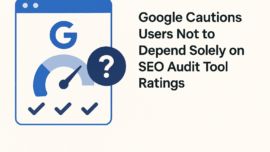
In a recent declaration, Google has advised webmasters and SEO professionals to refrain from placing undue reliance on the ratings offered by third-party SEO audit tools, emphasizing that these scores bear no weight in its ranking algorithms.
Contents
Short Summary:
- Google asserts that it does not utilize third-party SEO tool scores for its search rankings.
- SEO professionals should create high-quality content and implement Google’s best practices instead of solely depending on tool metrics.
- Third-party tools may provide insights but should not dictate a site’s SEO strategy.
In an age where digital presence is pivotal for business success, the significance of Search Engine Optimization (SEO) has surged to unprecedented heights. With the increasing number of SEO tools available on the market, webmasters and marketers alike have turned to these resources for streamlining their strategies. However, Google’s recent reminder to the community has ignited discussions, prompting a fresh perspective on the utility of such tools.
Google, the leading search engine globally, has publicly clarified that it does not use scores from third-party SEO audit tools to influence its rankings. In a recent session, Google’s Martin Splitt emphasized that third-party rankings are neither objective nor standardized, and they do not reflect the evaluation criteria established by Google itself. He stated during an SEO Office Hours session,
“A lot of these audits don’t specifically focus on SEO… many suggest outdated or irrelevant factors.”
This statement sheds light on a critical issue that has long resonated within the SEO community: the nuanced understanding of what should genuinely drive SEO strategy.
The Reality of SEO Tools
For many years, SEO practitioners relied heavily on various third-party tools, which claim to evaluate and enhance website performance. Tools like Moz, SEMrush, and Ahrefs are just a few in a long list of software solutions offering crawl reports, keyword analyses, and competitive insights. However, there are inherent limitations that come with this reliance.
- Narrow Perspectives: SEO tools can inadvertently narrow a marketer’s perspective. A focus on numerical and algorithm-driven recommendations might overshadow the essential needs of real users.
- Outdated Practices: As underscored by Martin Splitt, many tools still promote recommendations that no longer align with current best practices. Strategies like avoiding keyword stuffing or emphasizing text-to-code ratios lack relevance in today’s context.
- Over-simplification: The complexities of SEO cannot be distilled into a simple score. A myriad of factors—including content quality, user experience, and design—must be evaluated towards achieving optimal ranking.
According to Google, relying on these tools could lead to misguided strategies that ultimately don’t benefit content visibility or user satisfaction. When third-party tools recommend pursuing high competitive keywords without considering the context, it becomes easy to lose sight of genuine audience engagement.
Why Focus on Quality Content?
In a world saturated with unoriginal content, the adage “content is king” holds truer than ever. Google continuously updates its algorithms to prioritize high-quality, relevant content that serves user intent. Therefore, a robust SEO strategy should be anchored in content creation that addresses the user’s search query with depth and clarity.
When asked about third-party tools, Google’s Martin Splitt advised,
“Website owners should focus on producing relevant content while aligning with Google’s documented best practices rather than being overly fixated on tool scores.”
This statement reinforces that the heart of good SEO lies in writing for people, rather than robots managing data.
Utilizing Third-Party Tools Wisely
While Google’s caution against over-reliance on third-party audits is prudent, it doesn’t suggest complete abandonment of these tools. Instead, webmasters are encouraged to leverage them effectively as part of a broader strategy. Here are some practical approaches:
- Identify Areas for Improvement: Tools can provide guidelines on where your site may be lacking, such as broken links or site speed issues. Recognizing these weaknesses can initiate necessary improvements.
- Keyword Exploration: Use these tools to generate a list of potential keywords but vet their relevance to your audience. Long-tail keywords can often yield better results than broad search terms.
- Monitor Progress: Evaluate your SEO strategy through regular tracking of your site’s ranks and performance, allowing adjustments based on actual outcomes rather than arbitrary metrics.
The Road Ahead: A Balanced Approach
As we navigate the constantly changing landscape of SEO, practitioners must remember that maintaining a balance between automated tools and organic insights will lead to more sustainable results. Google’s advice to focus on genuine quality, user experience, and strategic content cannot be emphasized enough. By aligning basic audit results with an actionable content strategy, webmasters can drive meaningful results.
With platforms like Autoblogging.ai, integrating AI with content creation can further amplify efforts to produce high-quality, SEO-optimized articles tailored to audience interests—without solely counting on the recommendations of third-party tools.
In conclusion, while tools can simplify certain aspects of SEO, they should not be the linchpin of your strategy. By focusing on quality content and aligning practices with Google’s expectations, you can foster genuine connections with your audience and improve your search visibility responsibly. The goal should never be merely one of optimization but rather the crafting of exceptional online experiences that serve users at their core.
For those looking to enhance their understanding of SEO, our comprehensive knowledge base covers best practices and tutorials on navigating SEO with both creativity and technical acumen.
Do you need SEO Optimized AI Articles?
Autoblogging.ai is built by SEOs, for SEOs!
Get 30 article credits!

